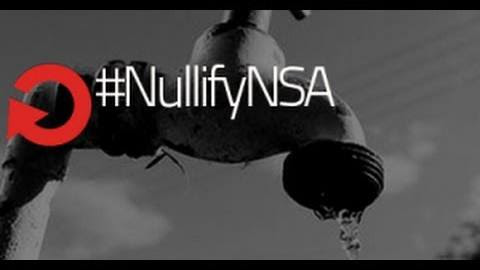According to OffNow.org , there are THREE steps that can be taken on a state level to make life difficult for the NSA.
1. 4th Amendment Protection Act. Our signature model legislation, the 4th Amendment Protection Act, would ban a state from taking actions which provide “material support” or assistance to warrantless federal spying programs. This includes provisioning of resources, and banning the state from using data obtained without warrant in state court.
States should pass this legislation whether they have a physical NSA facility or not, banning the warrantless data in court will have an immediate effect. And, since the NSA rarely publicizes its plans in advance, it’s essential to ensure that their ability to expand with more data center facilities around the country is restricted before they get off the ground. (learn more here)
2. Electronic Data Privacy Act. For those states where legislators are not yet willing or able to get the full 4th Amendment Protection Act passed, the Electronic Data Privacy Act is a powerful first step. By banning the use of warrantless data in court, this state legislation can thwart some of the practical effects of federal spying programs. (learn more here)
3. Freedom From Location Surveillance Act. A narrow, but important first step against the growing surveillance state, the Freedom From Location Surveillance Act bans state and local law enforcement from obtaining the location information of a person’s electronic device without a warrant.
The NSA is tracking the physical location of people through their cellphones. In late 2013, the Washington Post reported that NSA is “gathering nearly 5 billion records a day on the whereabouts of cellphones around the world.” This includes location data on “tens of millions” of Americans each year — without a warrant.
Shahid Buttar is the Executive Director of the Bill of Rights Defense Committee, a 2003 graduate of Stanford Law School, and has appeared in media outlets including the Intercept, the Guardian, the Washington Post, CNN, FOX News, Al-Jazeera and the Baltimore Sun. He spoke about NSA spying at Johns Hopkins recently to a packed audience organized by the Hopkins human rights working group and the New Political Society.
Kevin Zeese is an attorney and political activist who works on peace, economic justice, criminal law reform and reviving American democracy. He co Directs It’s Our Economy, serves on the steering committees of the Chelsea Manning Support Network, and is an organizer at PopularResistance.org. (Disclosure — Acronym TV receives partial financial support from Popular Resistance.)
***
ABOUT ACRONYM TV with Dennis Trainor, Jr.
Dennis Trainor, Jr. hosts Acronym TV, a weekly series of dialogue, conversation and debate with the goal of helping viewers sort through these transformative times through the insight of leading activists, artists, journalists, philosophers, scholars, and thinkers. Acronym TV is part of The Young Turks Network, the largest online news source in the world.
Acronym TV, what do you stand for?
Acronym TV also airs on Free Speech TV. FSTV is currently available in 37 million homes nationwide, airing on DISH Network (9415), DIRECTV (348), and Burlington Telecom (122) and streams all programs live at www.freespeech.org
Dennis Trainor, Jr. is a writer, host and producer. His documentary on the Occupy movement, American Autumn: an Occudoc, garnered critical praise from The New York Times, Variety, The Hollywood Reporter and more. He also wrote and directed Legalize Democracy, a documentary short about the Movement To Amend the Constitution. Trainor was an embedded YouTube personality/media advisor on the staff of Dennis Kucinich’s 2008 presidential campaign and his work is regularly published on The Huffington Post, Truth Out, The Real New Network, Popular Resistance and several others

